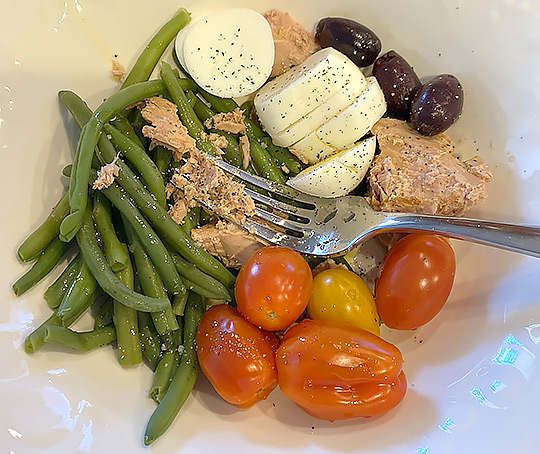Flexitarian with Flexibility
A Less Rigid Approach to Food
Out of all the diet labels, one has actually intrigued me…the Flexitarian Diet.
The idea of having a “flexible” style of eating without hard pressed rules seemed to be a reasonably good concept to me in our busy and unpredictable lifestyles. The Flexitarian Diet was born in the mid 2010’s in hopes of encouraging a reduction of meat intake due to environmental consequences, as well as health benefits (1) . A Flexitarian Diet is a semi-vegetarian diet that includes animal products on a more limited basis; therefore, reducing meat consumption overall, but not eliminating it. A large population-based Swiss study that looked at cardiovascular risk factors associated with vegetarian/semi-vegetarian type diets, showed that Flexitarians had significantly lower BMI’s & blood pressures (2). This diet can provide an environmentally friendly way to increase dietary fiber & nutrients, while reducing costs associated with an omnivorous diet. Along with the upsides of this style of eating, comes an increased risk of developing eating disorders. Studies have shown that as many as 25% of vegetarians develop an eating disorder with up to 50% of vegetarians at risk for developing one (3). Flexitarians may also present a similar risk as vegetarians for developing eating disorders if their motivation to adhere to this type of diet becomes distorted. For more nutritional advice call 724.934.3905 or use our quick and easy contact form.
 Here’s a Sample Flexitarian Menu:
Here’s a Sample Flexitarian Menu:
Breakfast
- SCRAMBLED EGGS OR SCRAMBLED TOFU
- AVOCADO TOAST
- FRESH STRAWBERRIES
Lunch
- SOUTHWEST SALAD
- (ROMAINE LETTUCE, QUINOA BLACK BEANS, CORN, PEPPERS, & TOMATOES)
- FRESH MELON
Snack
- CASHEWS OR CHEESE STICK
Dinner
- TOSSED SALAD
- BAKED ROSEMARY CHICKEN
- BROWN RICE
- GREEN BEANS ALMONDINE
I’m not one to put a label on things, so the diet culture of today, has never rested well with me. I have always believed that “diet” simply means the “type and way you eat”. Inevitably, I have found people seem to gravitate towards having a label for their style of eating. There is no shortage of diet labels, if you are in search of one. When I graduated from college in the early 1990’s, Low Fat Diets were the mainstay. Over the years, we have cycled through the Atkins, South Beach, the Zone, The Mediterranean, Low Carb, and Paleo. Also don’t forget Autoimmune Diet, Ketogenic Diet, Whole 30, Vegan, Intermittent Fasting, Vegetarian, Flexitarian, and Plant Based Diets, whew! How many of these have you tried? I have seen people work through the promises and pitfalls of them all usually in hopes of promised pounds lost & a healthier life.

Keep flexible with whatever pattern of eating you enjoy. Strict food rules rarely succeed and are often the start of disordered eating patterns.
For more nutritional advice call 724.934.3905 or use our quick and easy contact form.
1. Derbyshire E. J. (2017). Flexitarian Diets and Health: A Review of the Evidence-Based Literature. Frontiers in nutrition, 3, 55. https://doi.org/10.3389/fnut.2016.00055
2. Wozniak, H., Larpin, C., de Mestral, C., Guessous, I., Reny, J. L., & Stringhini, S. (2020). Vegetarian, pescatarian and flexitarian diets: sociodemographic determinants and association with cardiovascular risk factors in a Swiss urban population. The British journal of nutrition, 124(8), 844–852. https://doi.org/10.1017/S0007114520001762
3. Forestell C. A. (2018). Flexitarian Diet and Weight Control: Healthy or Risky Eating Behavior?. Frontiers in nutrition, 5, 59. https://doi.org/10.3389/fnut.2018.00059

 Here’s a Sample Flexitarian Menu:
Here’s a Sample Flexitarian Menu: